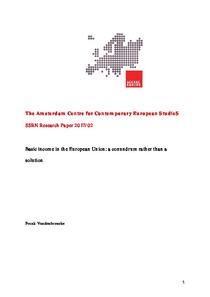Basic income in the European Union: a conundrum rather than a solution

Access Europe - Amsterdam
2017
37 p.
guaranteed income ; income distribution ; economic and social development ; European Union
SSRN Research Paper
2017/02
Social assistance and social work
English
Bibliogr.
"In Basic Income. A Radical Proposal for a Free Society and a Sane Economy, Philippe Van Parijs and Yannick Vanderborght table two arguments that focus explicitly on the European Union. Their first argument concerns strategies to introduce basic income at the national level: VP&V argue that there is a tension between national basic income and the European principle of free movement; to cope with the threat of selective immigration, the sustainability of national basic income imposes ‘firm limits on hospitality'. The second argument concerns the introduction of a pan-European basic income: VP&V contend that pan-European basic income is the best answer to social challenges created by European integration. In this paper, I develop three claims. My first claim is that VP&V are unclear about the consequences of ‘firm limits on hospitality' for the European principle of free movement: this renders their case ambiguous with regard to a core feature of the EU. National basic income seems incompatible with a consistent and legitimate logic of free movement and non-discrimination; to support this claim, I sketch a normative framework with regard to free movement and non-discrimination. My second claim concerns VP&V's case for pan-European basic income. If it is true that the EU's principal justice-related problem is that European integration has diminished core capabilities of national welfare states, such as national redistribution and national stabilization, without adequately ensuring their functioning at a higher level, the remedies to that problem are essentially different from a pan-European basic income. My third claim concerns both national basic income and pan-European basic income. The starting point of VP&V's case for basic income is compelling: we all benefit from a common inheritance, for which none of us did anything. However, more arguments are needed why basic income should be the priority amidst competing claims on the ‘gift' constituted by past technological, economic and social progress. In fact, the need to add a social dimension to the European project militates against rather than in favour of basic income, be it national or pan-European."
Digital
The ETUI is co-funded by the European Union. Views and opinions expressed are however those of the author(s) only and do not necessarily reflect those of the European Union or the ETUI.